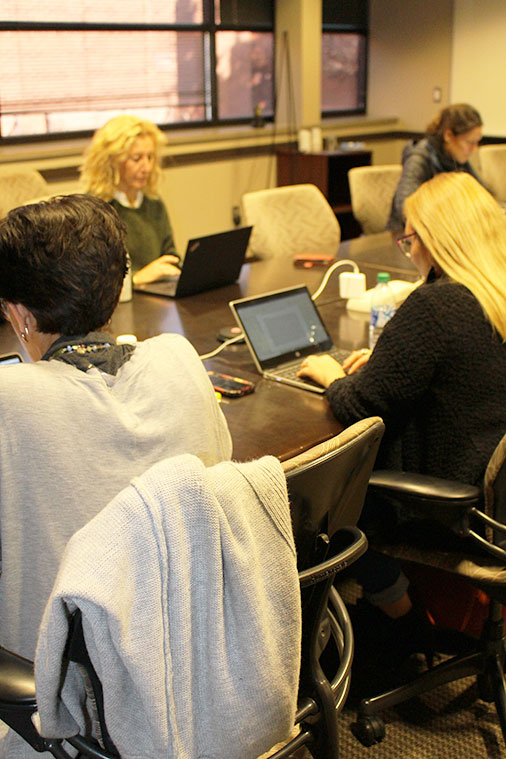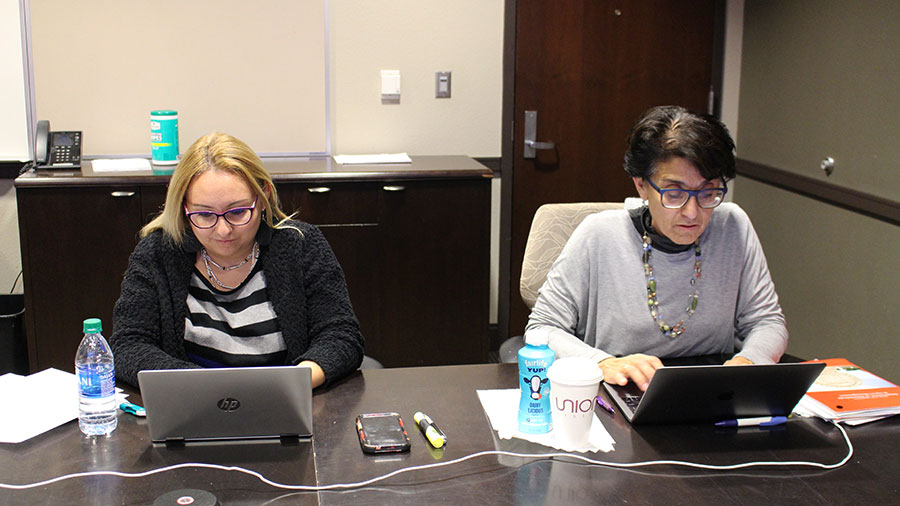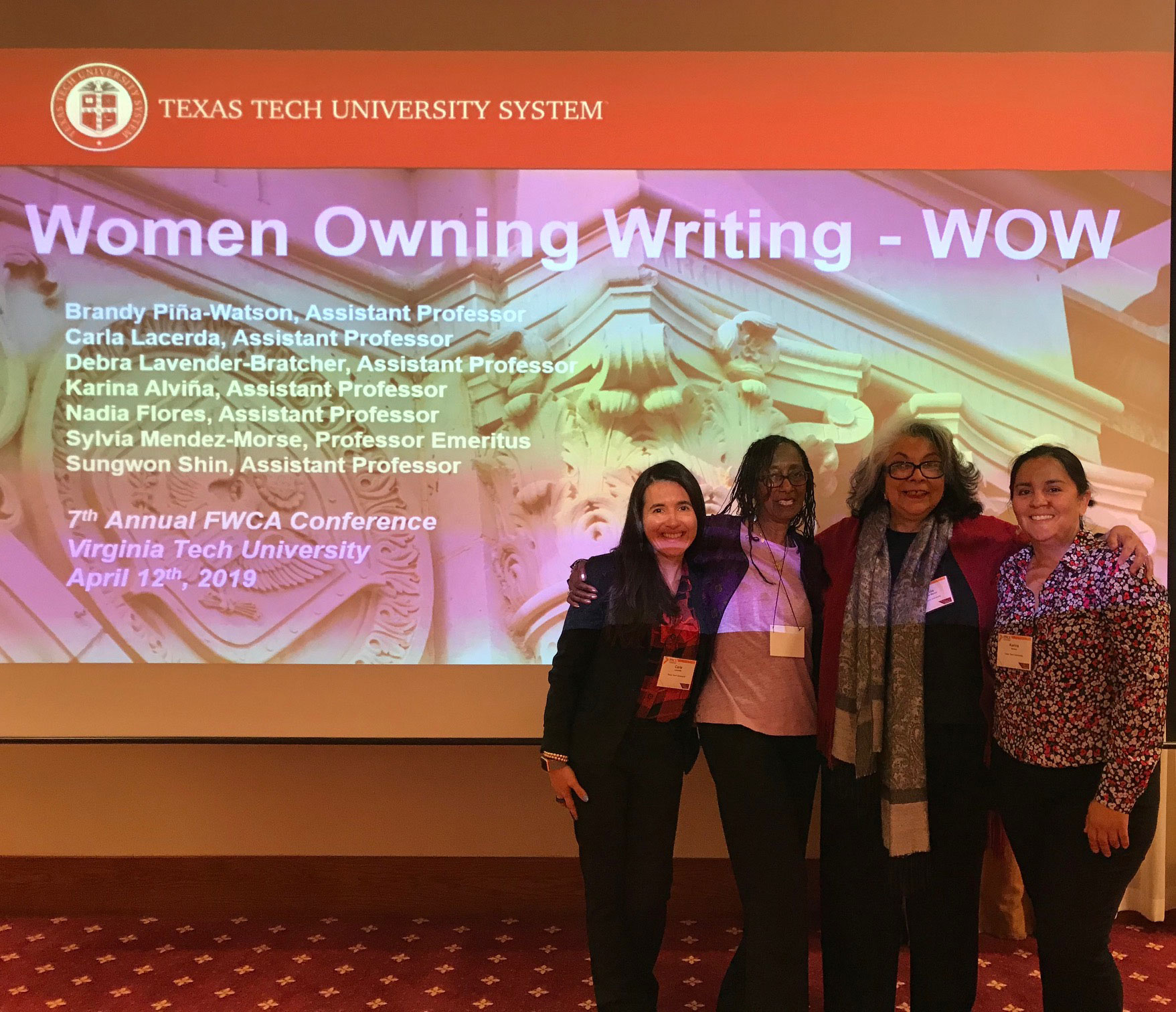Faculty Find Motivation, Community through Texas Tech Women Faculty Writing Program
By: Karen Michael

Surrounded by a dozen or so other faculty members typing furiously onto laptops around a conference table, some women have found motivation and a sense of community through the Texas Tech University Women Faculty Writing Program.
Kristin Messuri, the associate director of the Writing Centers of Texas Tech and co-director of the Women Faculty Writing Program, said support for the program from the university has grown, which has in turn, allowed the program to grow.
Early support from the program came from sponsors such as the President's Gender Equity Council, Writing Centers of Texas Tech, the Women's & Gender Studies Program, and the Office of Research and Innovation. Messuri said that list of sponsors has doubled to also include the Office of the President, Office of the Provost, TLPDC, and Division of Diversity, Equity, & Inclusion.
"That's been something that's been very exciting to see," Messuri said.
The support has meant that there are two specialized grant-writing groups, which differ from the main group in that they offer more specialized support for women who are seeking grants and fellowships. All the groups start with a discussion about an article or activity for 30 minutes, as well as time which the members can share what they are working on and get feedback from the others. Both types of groups then segue into writing, a 2.5-hour commitment to working on their research and writing activity they might be distracted from if they were in their own offices.
Not only are there research and grant writing groups, a writing group for women of color and a drop-in group have formed.
Almost 100 women are members of the program this semester, up from just 17 when the program started in 2015. There are 10 groups in total.
Membership is not the only metric on the rise, according to Messuri. In the spring semester of 2019, members of the groups had 233 accepted publications, including 28 grants or fellowships for $3.28 million, 46 journal articles, five books, 22 book chapters, three case studies, two book reviews, three keynote presentations, and 124 conference presentations.
If you only look at the impressive output of the women in the writing groups, you could miss the other benefits of membership in the Women Faculty Writing Program.
Motivation

Elizabeth Sharp is a professor of human development and family studies and the co-director of the Women Faculty Writing Program. She said the writing groups are intended as a way for women to hold each other accountable.
Women often spend more time doing service work and mentoring students, but they put their own work last. They might never miss a class unless they (or a family member) are very ill, but they will put off research. But Sharp said women's ideas are important, and they need to be writing and researching.
"Think of this as, as sacred as going to teach," Sharp said. "I like to think that we've helped the women set up this sacred time for their research. You are helping, just by showing up, you are helping role model that research is serious, and this is a big part of my job."
And maybe, she said, women who get ideas in writing will be excited to go and write more the next day in their own offices.
Six members of the Women Owning Writing (WOW) group, which consists of women of color on the Texas Tech campus, made a presentation at the Annual Women and Gender Studies Conference at Texas Tech last April. They were enthusiastic about the support they found in their group, which helps them balance teaching, service, research, and family responsibilities.
Nadia Flores, an associate professor of sociology, said showing up to the WOW group offered members a dedicated time for their writing.
"Believe it or not, it became for some of us, our only time that we could write for a whole week," Flores said.
Karina Alviña, an assistant professor in the Department of Biological Sciences, said the group works to make sure members can conquer scheduling and keep each other accountable for productivity. It is important for women to protect their productivity, she said, noting that it can be hard to get uninterrupted time in their offices.
"We sort of force ourselves to dedicate time to writing," she said. "We have uninterrupted time, dedicated."
Another group member, Sungwon Shin, an assistant professor in the Department of Educational Psychology and Leadership, said while the group offers peer pressure to keep each member writing, it is "positive peer pressure." She said she often hears other members clicking away at their keyboards and feels motivation to keep working.
Community
When she first heard about the possibility of starting women's writing groups, Messuri was intrigued. She had just arrived in Lubbock in early spring of 2015. When she joined the first group that fall, she said she found a way to meet other women from throughout the university.
"As a new person to Texas Tech, it gave me a community to belong to," Messuri said.
Now she knows someone at almost any event or meeting she attends on campus. Messuri said it is helpful for new faculty and staff to meet people who can help them learn how to navigate academic life, how to apply for grants, how to run a job search, and other processes on which faculty may need insight.
"It's a good place to gain that kind of insight," Messuri said.
The nurturing nature of these groups can also feed right back into the writing.
"It is important to have a nurturing environment that makes everyone more productive," said Carla Lacerda, an assistant professor in the Department of Chemical Engineering who is a member of the WOW group.
Sharp said she is glad that women are getting more done thanks to the writing groups, but she is most happy that people are feeling more connected.
Unintended results

Not only has the Texas Tech Women Faculty Writing Program produced a lot of writing and a sense of community, it has also inspired similar groups to pop up at other universities.
The group at Texas Tech began when Caroline Bishop, an assistant professor in Classical & Modern Languages & Literatures, mentioned to Sharp that she would miss being a part of writing group. Coming from Indiana University, she had been a member of such a group.
Sharp was excited about the concept and had a similar program up and running "within a couple of weeks."
Messuri said in the four years since the Texas Tech University Women Faculty Writing Program started, she and Sharp have worked on research on what is effective about these sorts of groups, what kinds of skills people are learning, and how they operate. When Messuri presented about her research about writing groups at conferences, other people began to come to her to find out how they could do something similar at their own institutions. Four other universities have formed similar groups as a result, she said.
"It's been exciting to see that idea spread and grow even beyond Texas Tech," Messuri said.
Discoveries
-
Address
Texas Tech University, 2500 Broadway, Box 41075 Lubbock, TX 79409 -
Phone
806.742.3905 -
Email
vpr.communications@ttu.edu
